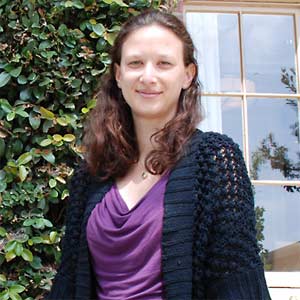
Maayan Roitfarb
USC Shoah Foundation Research Fellow
Maayan Roitfarb, a master’s candidate in law and diplomacy at Tufts University, is finishing up her position as a 2013 summer research fellow and intern at USC Shoah Foundation. During her fellowship, she conducted research for her master’s thesis about forced migration, relocation and deportation using the Visual History Archive (VHA), transcribed Hebrew sonderkommando testimony, completed a survey of 140 VHA testimonies concerning cultural resistance in the camps, and conducted background research on scholarly discussions of history, memory and emotions.
Fun Fact
I’ve spent four years studying Mandarin and I lived in China for a year.
What led you to your thesis topic and working with USC Shoah Foundation?
Growing up in Israel, the Holocaust is a major part of your life. Three of my grandparents are survivors. They either escaped to Russia by themselves or were deported by the Soviets and that’s what saved their lives. I always grew up with that, that my grandparents were part of the story but not really since there was not a direct connection to it, but it always affected me very deeply and that’s what brought me to Hebrew University in Jerusalem for my undergrad. I also worked at Yad Vashem as a museum guide and tour guide. It was very fulfilling and is probably one of my favorite jobs to this day.
What will you take away most from your time interning and researching at USC Shoah Foundation?
When you work in a place like the Shoah Foundation you’re improving the world. It might not be something you see every day but even if you come in and listen to one testimony a day it makes you a more conscientious person. In Israel there’s a Holocaust memorial day where a siren goes off and everybody stands up. There’s a whole day for that educational purpose. And there’s not a week that goes by that you don’t read something about the Holocaust. But in the U.S. where this is not everybody’s heritage, the VHA is something that can really help, and education should be used as a way of making sure this doesn’t happen again. I have been very impressed by the professionalism of the people working at the Shoah Foundation. It’s some of the best people in the field coming together for this cause that is very dear to me, and I felt very privileged to be a part of it.
What are your plans for the future?
I’m going back to Tufts for one more year to finish my master’s degree. I would really like to work with vulnerable populations. The Shoah Foundation has only strengthened in my mind that I would like to work in a place that makes a positive contribution. It sounds like a cliché, but it’s so important to me to work for a cause that I believe in.